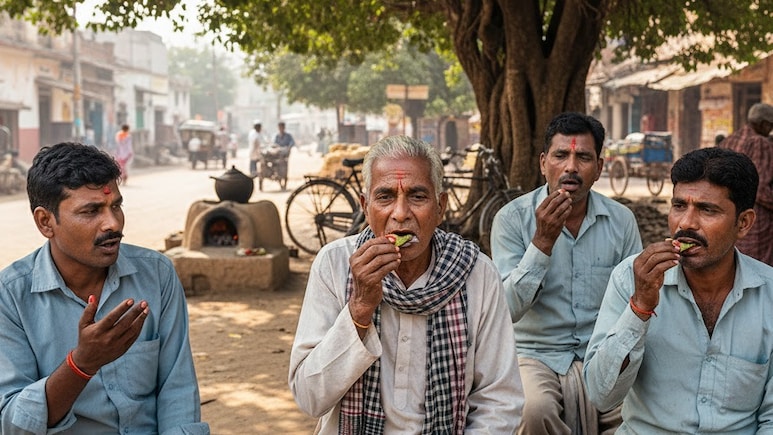
In Bihar, elections are not just about speeches, rallies, or slogans. They are also about things that are part of people's daily lives - machhli (fish), makhana (fox nut), and paan (betel leaf). These three items define Bihar's food, festivals, and feelings. And during elections, they quietly become part of politics too.
Fish in Bihar is more than food - it's a way of life. In North Bihar, especially in districts like Darbhanga, Samastipur, and Muzaffarpur, most people love eating fish and rice. In villages, no big occasion - whether a wedding, Chhath Puja, or community feast - is complete without 'machhli-bhaat' (fish and rice).
Fish is also a crucial source of livelihood. Thousands of families earn their living through fishing, most of whom belong to the Mallah or Nishad community. This community has become politically strong in recent years. Every major party wants their support.
Nitish Kumar's JD(U), Lalu Yadav's RJD, and the BJP have all made promises to fish farmers - pledging better ponds, hatcheries, fish markets, and cold storage facilities. Mukesh Sahni, who founded the Vikassheel Insaan Party (VIP), built his political identity around the slogan "son of the Mallah" and managed to win seats.
For these voters, a promise of fair prices for fish or government help to develop ponds means more than any grand economic speech. When leaders sit down and eat fish with locals during campaigns, it sends a simple but strong message - "We are with you."
Then comes makhana, the pride of Mithila. If fish belongs to Bihar's rivers, makhana belongs to its ponds. Bihar produces nearly all of India's makhana, grown mainly in the Mithilanchal region - Darbhanga, Madhubani, Supaul, and Saharsa. Makhana farming sustains lakhs of families in these districts.
In recent years, the Nitish Kumar government has tried to boost makhana production. The crop got a GI tag, a Makhana Research Centre was set up in Darbhanga, and farmers received help to sell their produce abroad. These efforts turned makhana from a local crop into a symbol of development - and a political talking point.
During elections, several politicians, including Prime Minister Narendra Modi, spoke about makhana as proof of "development." In Mithilanchal, people see makhana as part of their identity. Politicians know that talking about makhana means connecting with that local pride. For many, it's not just food - it's a story of transformation: from ponds to packaging factories, from small-scale farming to exports. For Bihar's youth, makhana represents hope - that the state's traditional products can create new jobs.
If machhli and makhana speak of work and income, paan speaks of culture and emotion. Bihar's Magahi paan from Gaya and Mithilanchal paan from Darbhanga are famous across India. Offering paan is a gesture of respect and friendship.
In Bihar, paan shops are more than just shops - they are everyday meeting points. Every evening, people gather there to talk about politics, cricket, and life. During elections, these paan shops turn into mini-debate centres. People discuss who's honest, who's worked, and who deserves to win. Many politicians make it a point to stop at paan stalls, share a few words, and smile for a photo - knowing how much that moment matters.
Thousands of families depend on paan cultivation. The Magahi paan trade supports villages across Nawada, Gaya, and Aurangabad. Paan growers often demand better irrigation, crop insurance, and government aid. Leaders who promise to support them earn easy goodwill. Even today, gifting a paan during visits or meetings is seen as a gesture of trust. And when leaders exchange paan with voters, it becomes a simple but powerful act that says, "We belong to the same soil."
Machhli, makhana, and paan tell a story about Bihar's people and their lives. They connect politics to everyday culture. Fish belongs to the Mallahs and Nishads of North Bihar. Makhana belongs to the Maithils of the northern plains. Paan belongs to the Magadh region in central Bihar. Together, they represent the spirit of the state - proud of its traditions and rich in diversity.
Political parties use these symbols smartly. While national leaders talk about big projects, local leaders talk about makhana farming, paan markets and fish ponds - subjects voters truly understand. A promise to open a fish seed centre or a makhana processing unit sounds far more real than a pledge to "create 5 lakh jobs."
Even government advertisements now feature ponds, paan leaves, and makhana crops. These are not just cultural symbols - they're big business. The combined trade of machhli, makhana, and paan in Bihar is worth over Rs 8,000 crore annually. That's a lot of livelihoods - and a lot of votes.
A private survey estimates that more than 15 lakh people depend on fishing, 3 lakh on makhana, and 2 lakh on paan. Their demands are simple - fair prices, better infrastructure, and protection against crop losses.
So, when a political party talks about these sectors, it's not merely discussing food - it's talking about families, incomes, and futures. In the coming election, these three symbols will return once again - in slogans, campaign songs, and community feasts. Fish will be served, makhana will be gifted, and paan will be shared at tea stalls where people laugh and argue about their leaders.
So when a political party or a leader talks about helping these sectors, it is not just talking about food - it is talking about families, incomes, and futures. In the coming election, these three symbols will again appear - in slogans, in campaign songs, and in local meetings. Fish will be served at community feasts, makhana will be offered to guests, and paan will be shared at tea stalls where people argue and laugh about their leaders.
In a state where emotion and tradition shape politics, this trio - machhli, makhana, and paan - will always carry the real flavour of Bihar's electorate.
Track Latest News Live on NDTV.com and get news updates from India and around the world

